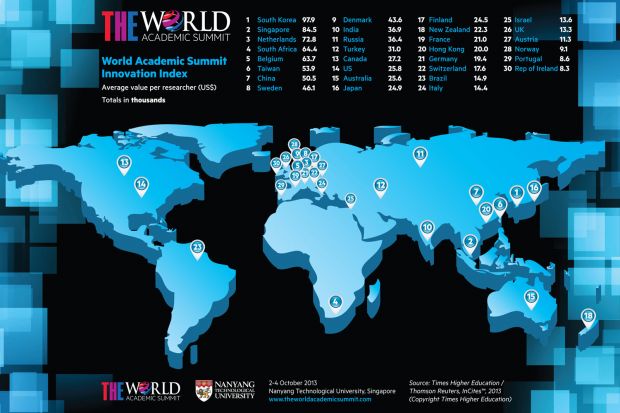Compiled by Times Higher Education, the World Academic Summit Innovation Index shows companies are investing the equivalent of £62,780 ($97,900) in each scholar in South Korea to carry out work in innovation and research on their behalf.
Singapore is in second place, bringing in an average of £54,462 ($84,500) per academic, with the Netherlands in third (£46,921; $72,800).
The US lies in 14th position, with industry contributing nearly four times less to its academic researchers (£16,628 or $25,800 per person) than in Korea, according to the index, which is based on data from the world’s top 400 universities as assessed by the THE World University Rankings.
The UK is in just 26th place, attracting £8,572 ($13,300) per researcher from industry.
Phil Baty, editor of the THE World University Rankings, said: “That South Korea and Singapore are the top two countries listed in this new table, with other Asian nations like Taiwan, China and India all making the top ten will be a shocking wake-up call for the West.”
Lord Bhattacharyya, chairman and founder of WMG, which receives about £120 million a year from private companies such as Jaguar Land Rover to do research at the University of Warwick, said the data underlined Britain’s “patchy” record for cooperation between business and universities.
Not enough British companies had invested in universities, while higher education had not made itself attractive enough to firms, he said.
“If businesses really exploited universities and universities exploited industry, our manufacturing sector would not be in the state it is now,” Lord Bhattacharyya argued.
Foreign firms were increasingly the ones to invest in university research, he said – citing Indian-owned Jaguar Land Rover as an example of a company investing in research.
“These are companies that have to develop world-class products or they will not survive,” said Lord Bhattacharyya. “British companies do not do research and development, and that is why the manufacturing industry is going down and down.”
Lord Bhattacharyya, who founded WMG in 1980, said the department’s success had paid for laboratories and buildings at Warwick worth £150 million, while an additional £100 million of private capital would soon be invested in its National Automotive Innovation Campus.
However, David Docherty, chief executive of the National Centre for Universities and Business, suggested the THE figures understate the level of commercial engagement with UK universities.
Academics were often involved in large amounts of consultancy work at large companies, estimated at about £3 billion a year, which might not feature in the THE data, Dr Docherty said.
Other types of collaboration between universities and business outside direct investment in research were also useful for the commercial sector and higher education, he argued.
“It tends not be investment in traditional university research these days,” he said.
“Companies are evolving their approach to universities, so they might put their own researchers on a university campus or build a unified campus with a university.”
However, Lord Bhattacharyya said talk of “partnerships” was over-rated unless businesses were willing to stump up money for investment.
“All this talk of ‘business in kind’ is a load of hocus-pocus,” he said.
“If industry does not pay cash, there is unlikely to be any results from it.”
However, a Department for Business, Innovation and Skills spokesman said the index is only based on a selection of universities and does not take into account the complete size of the research base in any given country.
He added: “The government has protected the £4.6 billion science and research budget in cash terms and has announced a real increase in science and research capital to £1.1 billion for 2015-16, with a commitment that this will be maintained in real terms until 2021.”
The THE index, compiled with Thomson Reuters data, has been published ahead of its inaugural World Academic Summit, at Nanyang Technological University, in Singapore, which will discuss the relationship between big business and universities.
Mr Baty said: “Working with business and industry to move their discoveries and ideas from the ivory towers into the real world – and to make a real social and economic impact – has become one of the most important functions of a modern university.
“For some, an ability to attract funding from big business could even be a case of sink or swim in this age of austerity.”
The THE World Academic Summit takes place in Singapore, from 2-4 October.
| Rank | Country | Average Value Per Researcher (US$) |
|---|---|---|
| 1 | Korea, Republic Of | 97,900 |
| 2 | Singapore | 84,500 |
| 3 | Netherlands | 72,800 |
| 4 | South Africa | 64,400 |
| 5 | Belgium | 63,700 |
| 6 | Taiwan | 53,900 |
| 7 | China | 50,500 |
| 8 | Sweden | 46,100 |
| 9 | Denmark | 43,600 |
| 10 | India | 36,900 |
| 11 | Russian Federation | 36,400 |
| 12 | Turkey | 31,000 |
| 13 | Canada | ,200 |
| 14 | United States | 25,800 |
| 15 | Australia | 25,600 |
| 16 | Japan | 24,900 |
| 17 | Finland | 24,500 |
| 18 | New Zealand | 22,300 |
| 19 | France | 21,000 |
| 20 | Hong Kong | 20,000 |
| 21 | Germany | 19,400 |
| 22 | Switzerland | 17,600 |
| 23 | Brazil | 14,900 |
| 24 | Italy | 14,400 |
| 25 | Israel | 13,600 |
| 26 | United Kingdom | 13,300 |
| Austria | 11,300 | |
| 28 | Norway | 9,100 |
| 29 | Portugal | 8,600 |
| 30 | Ireland | 8,300 |
Register to continue
Why register?
- Registration is free and only takes a moment
- Once registered, you can read 3 articles a month
- Sign up for our newsletter
Subscribe
Or subscribe for unlimited access to:
- Unlimited access to news, views, insights & reviews
- Digital editions
- Digital access to THE’s university and college rankings analysis
Already registered or a current subscriber? Login




